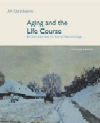1. What effect does aging have on creativity, wisdom, and intelligence?
Creativity has no clear association with aging. Although some great scientists
and artists have made their most significant contributions when they were in
their twenties, others have made creative contributions when they were in their
sixties, seventies or even older. Wisdom is a difficult concept to measure.
Since it involves a profound understanding of the world, it is likely to increase
with age. Psychologists describe two types of intelligence: fluid intelligence and crystallized
intelligence. Fluid intelligence involves reasoning, memory, and information-processing
skills. Crystallized intelligence refers to the information, skills, and strategies
learned through experience. Although some older people experience a slight loss
of fluid intelligence, aging appears to have no effect on crystallized intelligence. 2. How does aging change a person's ability to learn and remember?
Learning is the process of acquiring knowledge and skills. Studies of eye blink
classical conditioning show that learning ability slows down as people grow
older. Memory is the retention or storage of knowledge. Memory includes both
short-term memory, quickly committing a phone number to memory, for instance,
in order to dial it, and long-term memory, which is the storehouse of past experience.
Short-term memory is more dramatically affected by age than long-term memory. 3. What mental disorders are more common among the aged than among
the young?
Dementias are mental disorders that affect memory, cognitive functioning,
and personality. One common form of dementia that is most likely to occur in
old age is Alzheimer's disease. Symptoms of Alzheimer's disease include memory
loss, personality change, and loss of control of bodily functions. Older people
are also more prone to strokes than younger people. A stroke can damage speech
and language centers in the brain, causing aphasia, which means a language deficit.
A person with aphasia may be unable to produce meaningful speech and be unable
to understand written or spoken language. More than half of all stroke patients
develop vascular dementia, which impairs brain functioning. Parkinson's disease is a chronic brain disorder that becomes more common in
old age. Symptoms include a slowing of movement, a stooped posture, a shuffling
gait, and slurred speech. The drug L-dopa can control some of the symptoms but
it does not cure the disease. Clinical depression is more common among young
people, but the elderly are more likely to exhibit depressive symptoms. Depression
in old age is linked to stressors such as the loss of a loved one, chronic illness,
or financial problems. 4. How does a person's personality affect his or her ability to cope
with changes that come with age?
Personality influences the way an individual adapts to the changes associated
with normal aging. Personality traits are relatively enduring dispositions toward
thoughts, feelings, and behavior. The most unchanging component of personality
is temperament, an individual's characteristic style of reacting to people and
situations. Although personality tends to be stable, gender differences that
are quite distinct among young people tend to disappear as people grow older. 5. What stages of development do adults go through, and how do older
men and women differ in their development?
One of the first theories of adult development was proposed by the psychologist
Erik Erikson. Erikson suggested that there were eight stages of ego development,
beginning with infancy and ending with old age. Each stage has its own developmental
tasks and its own competing tensions. In middle age people enter the seventh
stage in which the opposing possibilities are generativity versus stagnation.
The major task is to establish and guide the next generation. In old age, the
eighth and final stage of life, the opposing tensions are between ego integrity
and despair. The central task is to integrate the painful conditions of old
age into a new form of psychosocial strength. Psychologist Daniel Levinson studied men and women in midlife to learn if there
was an underlying order to adult development. He discovered that people did
pass through a series of developmental stages that could be divided into a sequence
of eras, each with a distinctive bio-psychosocial character and each with explicit
developmental tasks. Psychologist Terry Apter conducted research on middle-aged
women and found four types-traditional, innovative, expansive, and protestors.
Each type approached midlife with a distinct orientation and each resolved the
crisis of midlife by defining a new self. |



 2002 McGraw-Hill Higher Education
2002 McGraw-Hill Higher Education